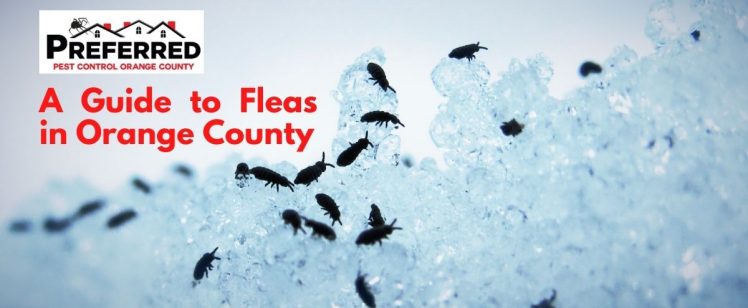-
- Nov 01
-
pestcontrol

- 0
A Guide to Fleas in Orange County
Fleas are microscopic insects that, despite their small size and brief lifespan (2-4 weeks), may create significant issues for humans. Fleas, which feed on the blood of a variety of animals, require a blood meal to continue their reproductive process. The fleas’ favorite hosts include dogs, cats, rats, deer, skunks, foxes, and other wild animals. Fleas will attack and feed on human blood if we are around, but they will not seek humans out. Fleas are well known for jumping out of the path of danger or onto their much bigger host utilizing their enormous, strong rear legs.
Fleas and Their Dangerous Affects
Fleas do feed on blood and are capable of housing and spreading some disease-causing bacteria; however, the spread of illnesses by fleas is not a major problem in the United States. Nonetheless, these pests generate a slew of other issues for both humans and pets:
- Their bite marks are hot and painful. Scratching to soothe the itch increases the risk of subsequent infection.
- Flea allergic dermatitis can occur in dogs that are susceptible to their saliva, producing severe itchiness and hair loss.
- Anemia can be caused by a severe flea infection in any pet or animal, leading the animal to become severely weak.
- Fleas act as a host for tapeworms, which can infect both people and animals.
- Their presence in a household may quickly become intrusive and stressful.
Flea Infestation in Orange County
Fleas are typically introduced to a property by wild animals or a stray dog or cat. After feeding, the female flea can lay up to 50 eggs every day, generally in the fur of an animal host. The eggs fall to the ground when the animal walks, where they will remain until the mammal develops into an adult.
The flea remains in a safe cocoon after fully maturing until a host comes along and stimulates them to emerge. They will climb onto the host, begin feeding, and the life cycle will continue. They enter your house unintentionally when they leap on you, your children, or your pets.
Fleas can also enter houses through upholstered furniture or rugs that have been contaminated with them.
Flea-borne typhus is a disease caused by the bacterium Rickettsia typhi, which is spread by fleas. Human instances of flea-borne typhus have been documented all throughout the world, but primarily in tropical and coastal locations. The majority of occurrences in the United States occur in Texas, California, and Hawaii, with an annual average of roughly 300 cases. Flea-borne typhus is considered endemic (always present) in sections of Los Angeles and Orange counties in California, although instances have been documented from other parts of the state as well. Typhus may be contracted by getting into touch with fleas infected with the bacterium that causes typhus. Fleas become infected by biting tiny animals such as rats, opossums, and stray cats. Fleas can then infect other animals with the bacterium that causes typhus.
Breeding Ground for Fleas
Fleas may reproduce both inside and outside, making them difficult to regulate and remove. Fleas thrive in warm, humid environments, enjoying temperatures ranging from 70 to 90 degrees. Adult fleas remain in their cocoons during colder weather until circumstances improve. They may survive in their cocoons for up to a year without eating, which is why these pests are so tough to manage.
Adult fleas wait in their cocoons outside for a host to come by, which causes them to emerge, jump on the host, and begin feeding. They are most commonly found in moist, sandy soil. Common hiding places include the dirt behind leaf heaps, decks, woodpiles, and thick vegetation. Fleas are either eating on a host (your pet) or waiting for a host to come by within our houses. They conceal themselves in carpets, soft furnishings, baseboards, and bedding.
Although you may take steps such as keeping your home clean to keep pests at bay, keeping fleas at bay can be difficult. As a result, before bugs establish a major infestation in your home, you should contact a competent pest treatment company. Preferred Pest Control, Orange County’s best exterminator, can handle this issue. We combine tried-and-true processes, cutting-edge technology, and trained workers to ensure that fleas are no longer a problem when we finish.
ORANGE COUNTY PEST CONTROL
Welcome to the website of the last pest, termite, and rodent company you’ll ever need again. We’re homeowners, parents, and pet owners that strive to live up to our motto Honesty, Integrity, and Excellence. We are a full service OC Pest Control Company that believes in exceeding our customer’s expectations.
We offer our Contracting Services throughout many Southern California Counties and Cities:
- Orange County contract services
- Anaheim contract services
- Westminster contract services
- Fountain Valley contract services
- Irvine contract services
- Cypress contract services
- Garden Grove contract services
- Fullerton contract services
- Huntington Beach contract services
- Newport Beach contract services
- Costa Mesa contract services
- Seal Beach contract services
17150 Newhope #904 Fountain Valley, CA 92708 • Phone: (714) 486-2637 • Fax: (714) 274-9867 • Email: info@
preferredpestcontroloc.com htt p://preferredpestcontroloc. com/
Preferred Pest Control is proud to serve Fountain Valley, Huntington Beach, Costa Mesa, and other surrounding Orange County communities with world-class pest control services. Let us know how we can help, and we’ll be in touch shortly with your free quote.
We accept all major credit cards!

